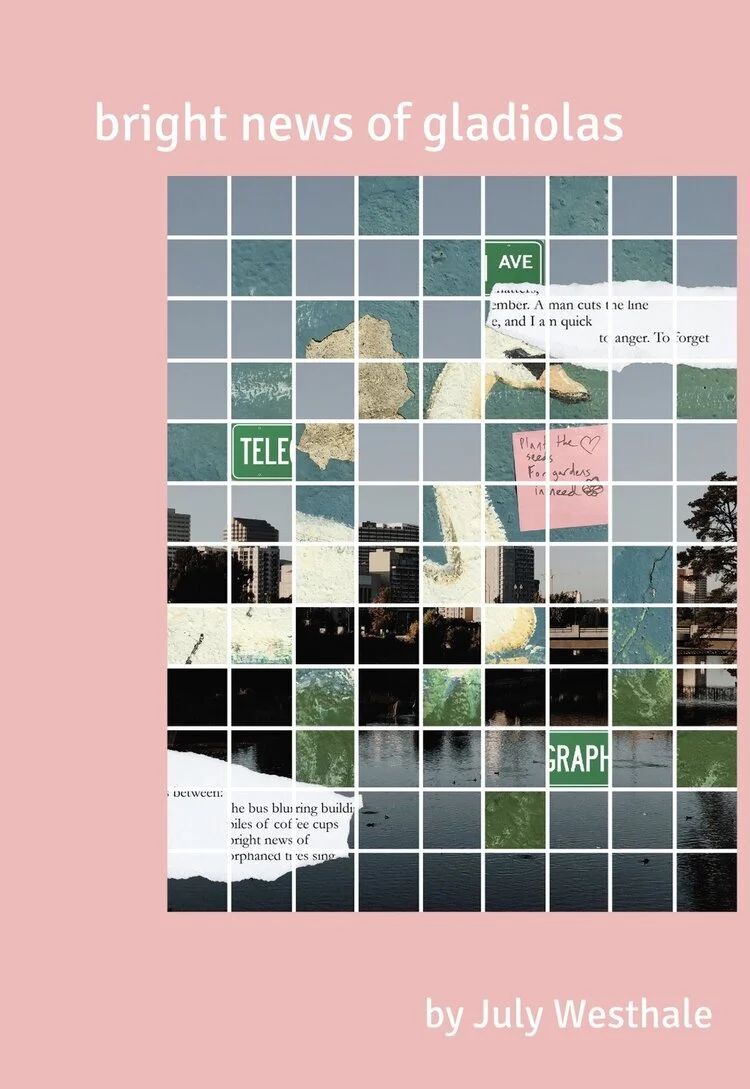BRIGHT NEWS OF GLADIOLAS BY JULY WESTHALE,
REVIEWED BY CAMERON MORSE
There is freedom in maturity. Form and content. bright news of gladiolas (Harbor Editions, 2021) is an excellent demonstration of experimental freedom by the mature poet/educator, July Westhale. Poems like “76 station, with a broken pump” display an aptitude for familiar forms (tercets here, couplets elsewhere) while the book’s opener, “aerial view,” resembles an exploded prose poem and others edge toward the exploration of hybridity. In terms of content, “76 station,” dedicated to the late poet and recluse Hayden Carruth, pioneers a twangier voice unheard in other poems whose images (“the clouds / are perfect memes of themselves”) and colloquialisms (“I’m sorta invincible”) sparkle with contemporary usage.
An awareness of nuances cultivated in poetry workshops (the MFA industrial complex) displays itself when Westhale, for instance, parses verb tenses (“But that was the thing // we enjoyed about it. Enjoy. Present tense.”) or shifts speaker pronoun identity (“the unspooling that happens when we, I, I mean I play a memory over again for the too-many-ith time”). Self-awareness gives us confidence of being in the hands of a master craftsperson.
Numerous instances of self-referentiality—the cat who “eats the birds in poems,” “stanza breaks between metropolises,” “the poet opened my mouth and shot me gone”—indicate a poet not only in command of the intricacies of her craft but also invested in the fate, or (feminist) future, of poetry itself. In “patron saint of drank too much,” a speaker asks to be shown our “yellow paper book,” wants to hear our “gasp of panorama.” She protests:
The filthiest and most
secret places in the city melt to meet the world,
I pay and I pay and I pay for trespasses of men
from my two countries and their bickering—still
I come back: Santiago eaten down to the root—
blame transubstantiation, or the women
who taught us all to dance first and talk later,
but never blame the poem. Not the first time,
nor after the poet dies. Decomposes.
This is apologetics for poetry, a defense of the beautiful, “the snow on the ocean,” in a world of father-sins-best exemplified by “the old letch” in “not all men,” yet Westhale makes no apology for herself, she simply convinces us with her mastery, her belief.
February 2021
Cameron Morse
Cameron Morse is Senior Reviews editor at Harbor Review, a poetry editor at Harbor Editions, and the author of six collections of poetry. His first, Fall Risk, won Glass Lyre Press’ 2018 Best Book Award. His latest is Far Other (Woodley Press, 2020). He holds and MFA from the University of Kansas City—Missouri and lives in Independence, Missouri, with his wife Lili and two children. For more information, check out his Facebook page or website.



